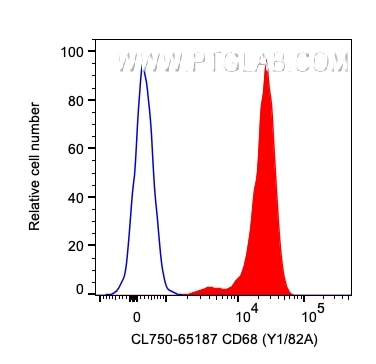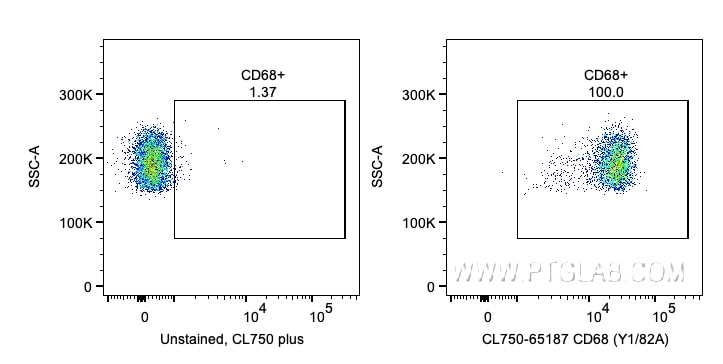CD68 Monoklonaler Antikörper
CD68 Monoklonal Antikörper für FC (Intra)
Wirt / Isotyp
Maus / IgG2b, kappa
Getestete Reaktivität
human
Anwendung
FC
Konjugation
CoraLite® Plus 750 Fluorescent Dye
CloneNo.
Y1/82A
Kat-Nr. : CL750-65187
Synonyme
Geprüfte Anwendungen
| Erfolgreiche Detektion in FC | humane PBMCs |
Empfohlene Verdünnung
| Anwendung | Verdünnung |
|---|---|
| This reagent has been pre-titrated and tested for flow cytometric analysis. The suggested use of this reagent is 5 μl per 10^6 cells in a 100 µl suspension or 5 μl per 100 µl of whole blood. | |
| Sample-dependent, check data in validation data gallery | |
Produktinformation
CL750-65187 bindet in FC CD68 und zeigt Reaktivität mit human
| Getestete Reaktivität | human |
| Wirt / Isotyp | Maus / IgG2b, kappa |
| Klonalität | Monoklonal |
| Typ | Antikörper |
| Immunogen | Lysosomaler Inhalt von Lungenmakrophagen |
| Vollständiger Name | CD68 molecule |
| Berechnetes Molekulargewicht | 37 kDa |
| GenBank-Zugangsnummer | BC015557 |
| Gene symbol | CD68 |
| Gene ID (NCBI) | 968 |
| Konjugation | CoraLite® Plus 750 Fluorescent Dye |
| Excitation/Emission maxima wavelengths | 755 nm / 780 nm |
| Form | Liquid |
| Reinigungsmethode | Mit Protein-A-Affinitätschromatographie gereinigt |
| Lagerungspuffer | PBS with 0.09% sodium azide and 0.5% BSA |
| Lagerungsbedingungen | Store at 2-8°C. Avoid exposure to light. Stable for one year after shipment. |
Hintergrundinformationen
CD68 is a type I transmembrane glycoprotein that is highly expressed by human monocytes and tissue macrophages. It belongs to the lysosomal/endosomal-associated membrane glycoprotein (LAMP) family and primarily localizes to lysosomes and endosomes with a smaller fraction circulating to the cell surface. CD68 is also a member of the scavenger receptor family. It may play a role in phagocytic activities of tissue macrophages.
Protokolle
| PRODUKTSPEZIFISCHE PROTOKOLLE | |
|---|---|
| FC protocol for CL Plus 750 CD68 antibody CL750-65187 | Download protocol |
| STANDARD-PROTOKOLLE | |
|---|---|
| Klicken Sie hier, um unsere Standardprotokolle anzuzeigen |



